Biopesticides are an important tool for farmers because they can help to reduce crop damage caused by pests while also being safe for humans and the environment. The future of biopesticides in agriculture looks bright due to the increasing demand for organic food, the bans on harmful pesticides, and the need for sustainable agriculture practices.
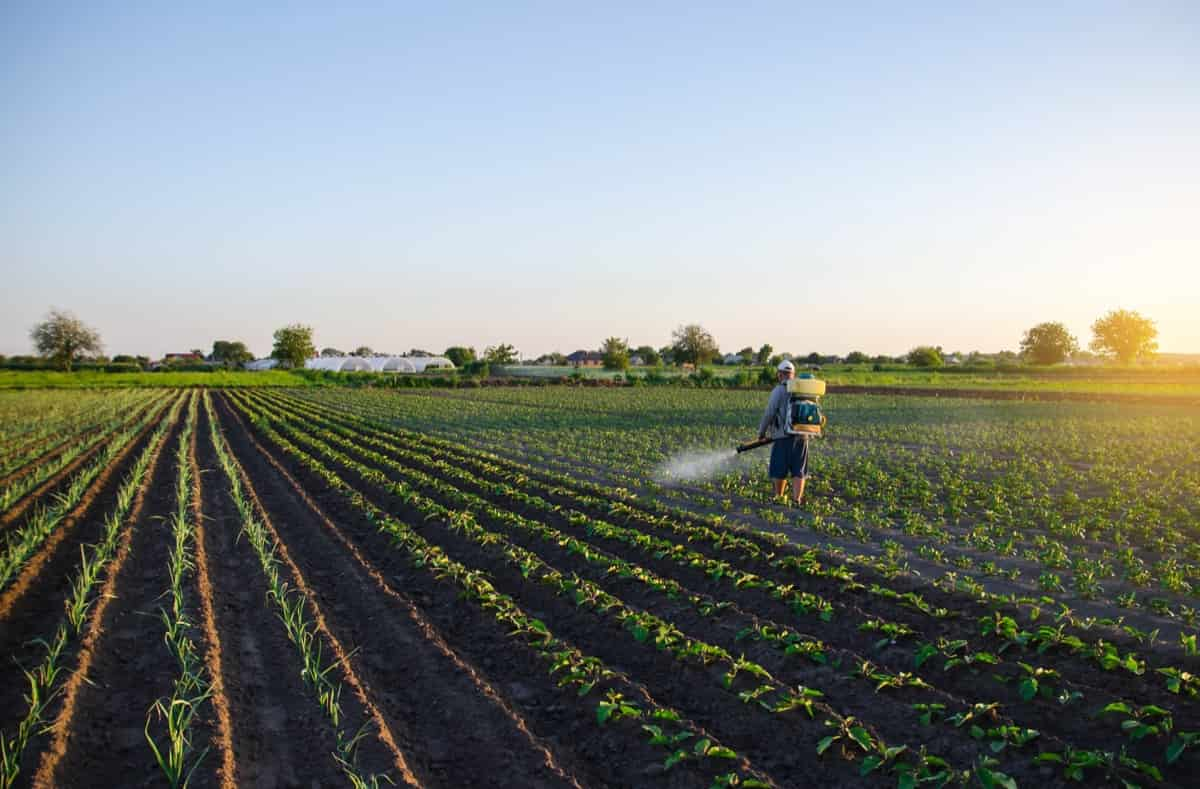
Importance of Biopesticides and Their Role in Agriculture
What are Biopesticides in Agriculture?
Biopesticides are pesticides from natural materials such as animals, plants, bacteria, and minerals. They are safe for the environment and humans because they are naturally occurring.
Main Types of Biopesticides in Agriculture
Microbial Pesticides
Microbial pesticides are made from bacteria, fungi, or viruses that kill or control pests. Microbial pesticides consist of living organisms that control pests. They can be viruses, bacteria, fungi, or protozoa. Microbial pesticides usually work by infecting and killing the pest. For example, Bacillus thuringiensis is a bacterial pesticide that controls caterpillars and beetles. Microbial pesticides can be applied using conventional spraying equipment and are often compatible with other pest management practices such as biological control and integrated pest management (IPM).
Biochemical Pesticides
These are made from naturally occurring substances that kill or control pests. They work by disrupting the pest’s life cycle or interfering with its feeding ability. For example, neem oil is a biochemical pesticide that controls aphids, whiteflies, and other insects.
In case you missed it: How to Unlock Key Technologies to Improve Food Security: Reduce Pesticide Use and Enhance Crop Climate-Resilience
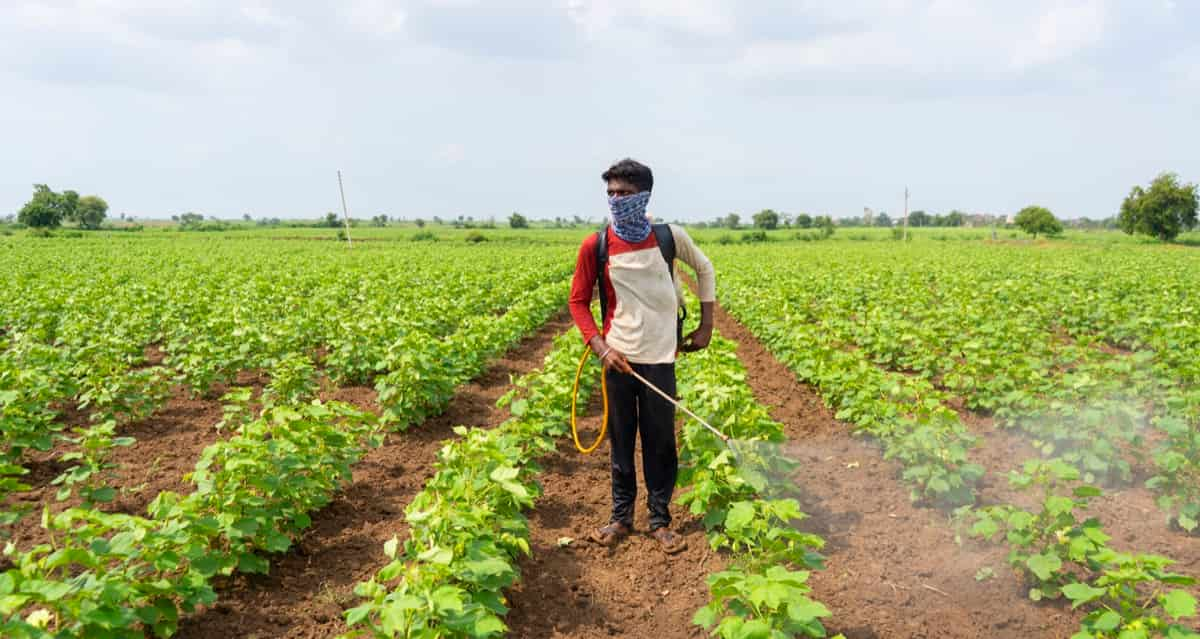
Plant-incorporated Protectants (PIPs)
Plant-incorporated protectants (PIPs) are chemicals plants produce that protect them from pests. PIPs can be toxins from bacteria or viruses, enzymes, or other compounds. PIPs usually work by affecting the pest’s digestive system so that it cannot eat the crop plant. For example, Bt corn is a type of PIP that produces a toxin that kills caterpillars. Plant-incorporated protectants (PIPs) are pesticides that plant themselves produce.
PIPs offer many benefits to farmers, including improved crop yields, reduced pesticide use, and improved environmental safety. PIPs can be used to control a wide variety of pests, including insects, fungi, and weeds. They are often more effective than traditional chemical pesticides at controlling these pests and pose a lower environmental risk. PIPs are an important tool in sustainable agriculture. By reducing the need for chemical pesticides, PIPs help farmers reduce their reliance on harmful chemicals and improve the sustainability of their operations.
Advantages of Using Biopesticides in Agriculture
- Biopesticides are an important tool in sustainable agriculture. They help farmers to produce food safely and efficiently without harming the environment.
- There are many advantages to using biopesticides in agriculture. They are more selective than chemical pesticides, making them less likely to harm beneficial insects and other animals.
- They are also often more effective at targeting specific pests, making them more cost-effective in the long run. In addition, biopesticides tend to break down more quickly in the environment and pose less risk to human health.
- Biopesticides are an important tool for farmers and ranchers because they are often more environmentally friendly than traditional chemical pesticides. They can also be more effective at controlling pests and often break down quickly in the environment.
How Do Biopesticides Work?
- Biopesticides are pest control agents that are derived from natural materials and organisms. They can be used to control a wide variety of pests, including insects, nematodes, fungi, bacteria, and viruses. Biopesticides can be used as an alternative or in conjunction with traditional pesticides.
- Biopesticides work in several ways. Some biopesticides act as repellents, deterring pests from entering or feeding on crops. Others release toxins that kill pests outright. Some biopesticides work by interfering with the pest’s life cycle, preventing them from maturing or reproducing.
- Biopesticides work in a variety of ways to control pests. Some biopesticides act as repellents, making it difficult for pests to find and eat crops. Others release toxins that kill pests or interfere with their ability to reproduce. Some biopesticides attract predators or parasites of the pest, which help to reduce the pest population.
- Biopesticides can be applied in several ways, including spraying, soil incorporation, and seed dressing. They are typically used at lower rates than chemical pesticides and have a shorter residual activity. This means that biopesticides pose less risk to human health and the environment.
In case you missed it: Glasshouse Farming: For Increased Yields and Reduced Pesticide Use
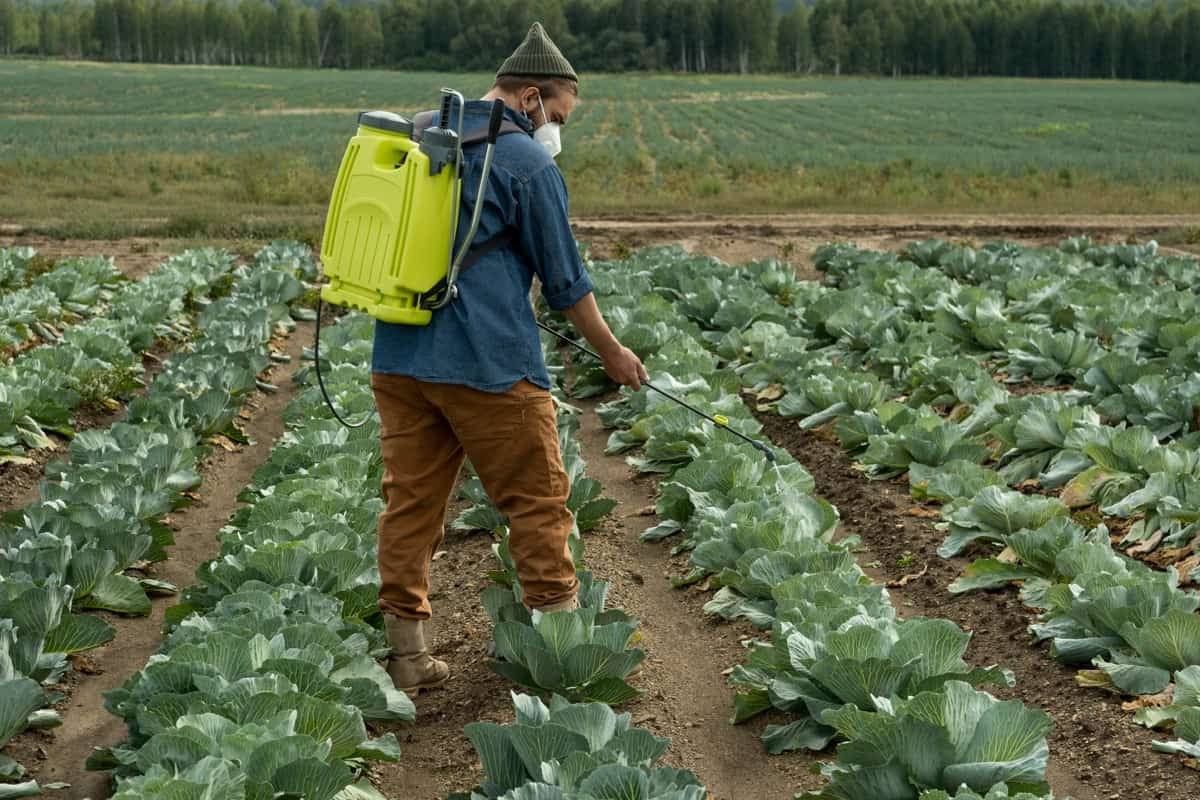
Biopesticides Applications in Agriculture
Biopesticides are an essential part of sustainable agriculture because they are typically more specific to the target pest, less toxic to non-target organisms and break down more quickly in the environment than conventional pesticides. Biopesticides can control various agricultural pests, including insects, weeds, fungi, and nematodes. Insecticidal biopesticides are often used as an alternative to conventional insecticides to control crop pests. For example, Bacillus thuringiensis (Bt) is a bacterium that produces toxic proteins for certain insects.
Bt crops have been genetically engineered to express these insecticidal proteins and effectively control crop pests. Weed control is another important application of biopesticides in agriculture. Many biopesticides are selective herbicides that only kill specific weed species without harming the crops or other desirable vegetation. For example, glyphosate is a broad-spectrum herbicide effective against many common weed species.
However, glyphosate is also non-selective and will kill any plant it comes into contact with. This can be problematic for farmers who want to protect their crops from glyphosate damage. Weed control is one of the most important applications of biopesticides in agriculture. Biopesticides are effective against many weeds, including annual and perennial grasses, broad leaves, and sedges. They can be used to control weeds in both crop and non-crop areas.
Biopesticides Used as Fungicides in Agriculture
Fungicides are another type of biopesticide that can be used in agriculture. Fungi are one of the most important plant pathogens, causing diseases that can significantly reduce crop yields. Fungicides are, therefore, an essential part of crop protection programs. However, the use of synthetic fungicides can have negative impacts on the environment.
Biopesticides offer a more sustainable alternative, typically based on natural substances that are less toxic to humans and other organisms. Several different biopesticides can be used as fungicides in agriculture. One example is Bacillus subtilis, which produces enzymes that kill fungal cells. Another is Trichoderma harzianum, a fungus that parasitizes other fungi and competes with them for space and nutrients.
Both of these biopesticides are available commercially and effective against various fungal diseases. Biopesticides are often combined with other approaches, such as cultural control methods (e.g., crop rotation) and breeding for resistance. This integrated approach is necessary for the sustainable management of fungal diseases in agriculture.
In case you missed it: Natural Pesticides Preparation; Application for Field Crops

Some Examples of Biopesticides in Agriculture
Bacillus Thuringiensis
It is a naturally occurring bacteria that produce deadly toxins for certain insects. When B. thuringiensis is used as a biopesticide, the bacteria coat the plants’ leaves. The insects that eat the plants ingest the bacteria, which then multiply in their gut and release toxins, causing them to die. BT is a bacterium that produces toxins that are deadly to certain insects but pose no threat to humans or animals. It is commonly used to control caterpillars, beetles, and flies.
Pyrethrin
Another biopesticide used is Pyrethrin. Pyrethrin is another biopesticide made from natural compounds found in certain chrysanthemum flowers. Pyrethrin attacks an insect’s nervous system, causing paralysis and death. Pyrethrins are a group of natural, biodegradable insecticides derived from the flowers of certain African chrysanthemum species.
Pyrethrins have been used in agriculture for over 50 years and are considered to be among the safest and most effective insecticides available. Pyrethrins are most commonly used to control aphids, whiteflies, thrips, and other small insects on various crops, including fruits, vegetables, ornamentals, and turf.
Spinosad
Spinosad is a naturally-occurring compound that is toxic to a wide range of insects. It is used as an alternative to chemical pesticides. Spinosad biopesticides are a class of pesticides derived from the fermentation of Saccharopolyspora spinosa, a soil-dwelling bacterium. Spinosad insecticides are effective against various insects, including caterpillars, beetles, thrips, and leafminers.
They are used in various crops, including vegetables, fruits, grains, and ornamentals. Spinosad biopesticides work by causing nerve damage in insects that ingest or come into contact with the pesticide. This nerve damage leads to paralysis and death. Spinosad pesticides are relatively new to the market and are effective against pests resistant to other pesticides.
Beauveria Bassiana
Beauveria bassiana is a fungus that kills or repels various pests, including ants, cockroaches, and mosquitoes. Beauveria is a soil-dwelling fungus that produces spores that can kill or paralyze certain insects.
Neem Oil
It is derived from the neem tree seeds and has been used for centuries to control pests in India. It is effective against several different types of insects, including aphids and whiteflies. Neem oil is a biopesticide that can be used in agriculture. It is made from the neem tree and has been used for centuries in India. Neem oil is effective against many pests, including aphids, whiteflies, and mites.
In case you missed it: Ways to Use Neem Oil in Plants: Benefits in Agriculture, Application Method in Garden, and Uses in Hydroponics
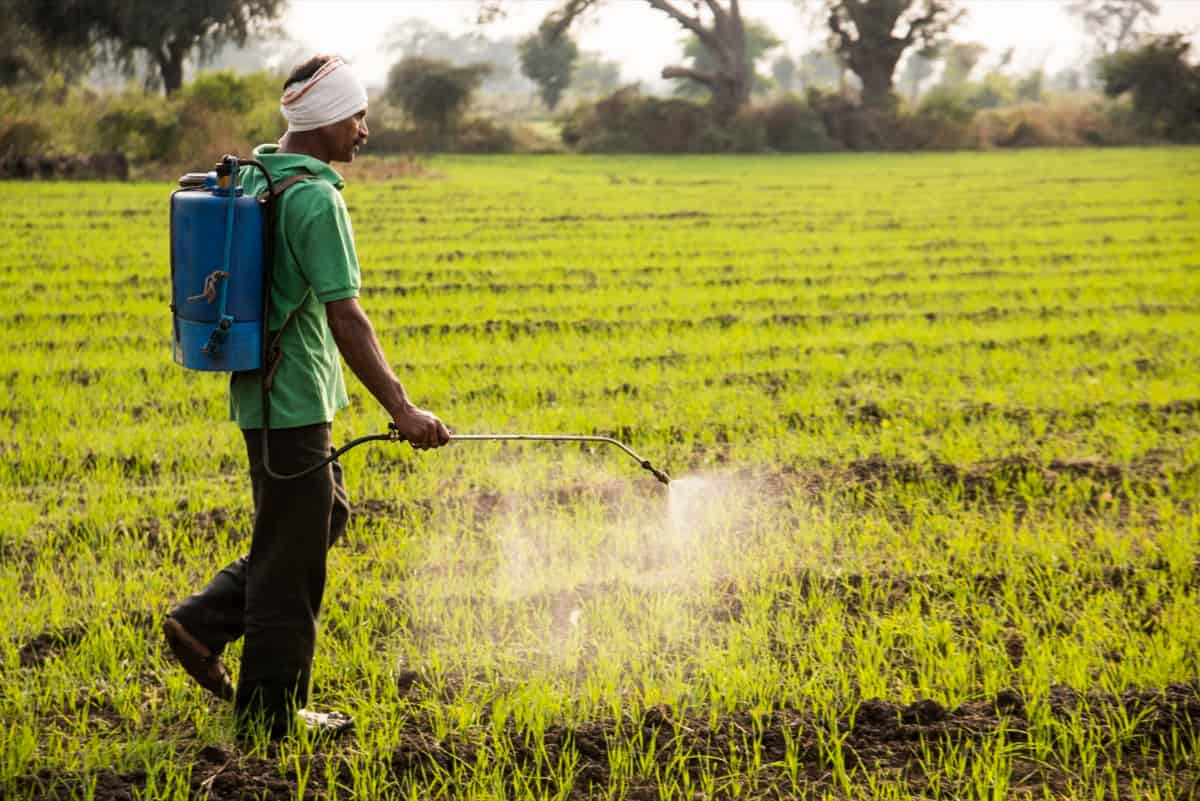
It can also be used as a fungicide and insecticide. It is safe for humans and animals and does not harm the environment. Neem oil is effective against various pests, including insects, mites, nematodes, and fungi. It can be used as a seed treatment, soil drench, or foliar spray. It is considered safe for humans and animals when used as directed.
Trichoderma Spp.
Trichoderma is a genus of fungi that can parasitize other fungi. It is often used as a biological control agent against plant pathogens such as Pythium and Phytophthora. Trichoderma is a naturally occurring fungus that can be used as a biopesticide in agriculture. It exists in the soil and on plant surfaces and can help control plant pathogens. Trichoderma can be applied to seeds or plants and acts as a barrier to prevent pathogens from infecting the plant. It can also help break down organic matter in the soil, improving soil fertility.
Trichogramma
Agricultural biopesticides are becoming increasingly popular as farmers seek more sustainable and environmentally friendly ways to protect their crops. Trichogramma is a type of biopesticide that can control various pests, including caterpillars, moths, and beetles. This biological control agent consists of tiny wasps that parasitize the eggs of these pests, preventing them from hatching and causing damage to crops.
Metarhizium Spp.
Metarhizium is a genus of fungi that parasitizes other fungi and insects. It is commonly used as a biological control agent against aphids, whiteflies, and caterpillars.
NPV
NPV (nucleopolyhedrovirus) biopesticides are made from a naturally occurring virus that infects and kills insect larvae. When applied to crops, the NPV biopesticide infects the larvae of harmful insects, causing them to die before they can cause damage to the crop. NPV biopesticides are safe for humans and animals. They are also effective against a wide range of common agricultural pests, making them an ideal choice for farmers looking for an eco-friendly pest control solution.
Baking Soda
Baking soda is an effective and safe biopesticide for use in agriculture. It can be used to control a variety of pests, including aphids, mites, whiteflies, and caterpillars. Baking soda works by disrupting the life cycle of the pest and causing it to dehydrate and die. It is most effective when applied early in the pest’s life cycle.
The Future of Biopesticides in Agriculture
- The future of biopesticides in agriculture looks very promising. With the ever-growing population and the demand for food, there is a need for more efficient and environmentally friendly crop production methods. Biopesticides offer a sustainable solution to this problem.
- Biopesticides are derived from natural sources such as plants, bacteria, and fungi. They are effective against various pests, including insects, weeds, and diseases. Unlike chemical pesticides, biopesticides are safe for humans and animals and have a minimal environmental impact.
- Biopesticides are expected to grow in popularity due to their safety, efficacy, and environmental friendliness. Farmers who adopt these products will be able to produce food more efficiently and sustainably, meeting the needs of our growing population.
In case you missed it: 10 Organic Fertilizers for Your Vegetable Garden: When and How to Apply
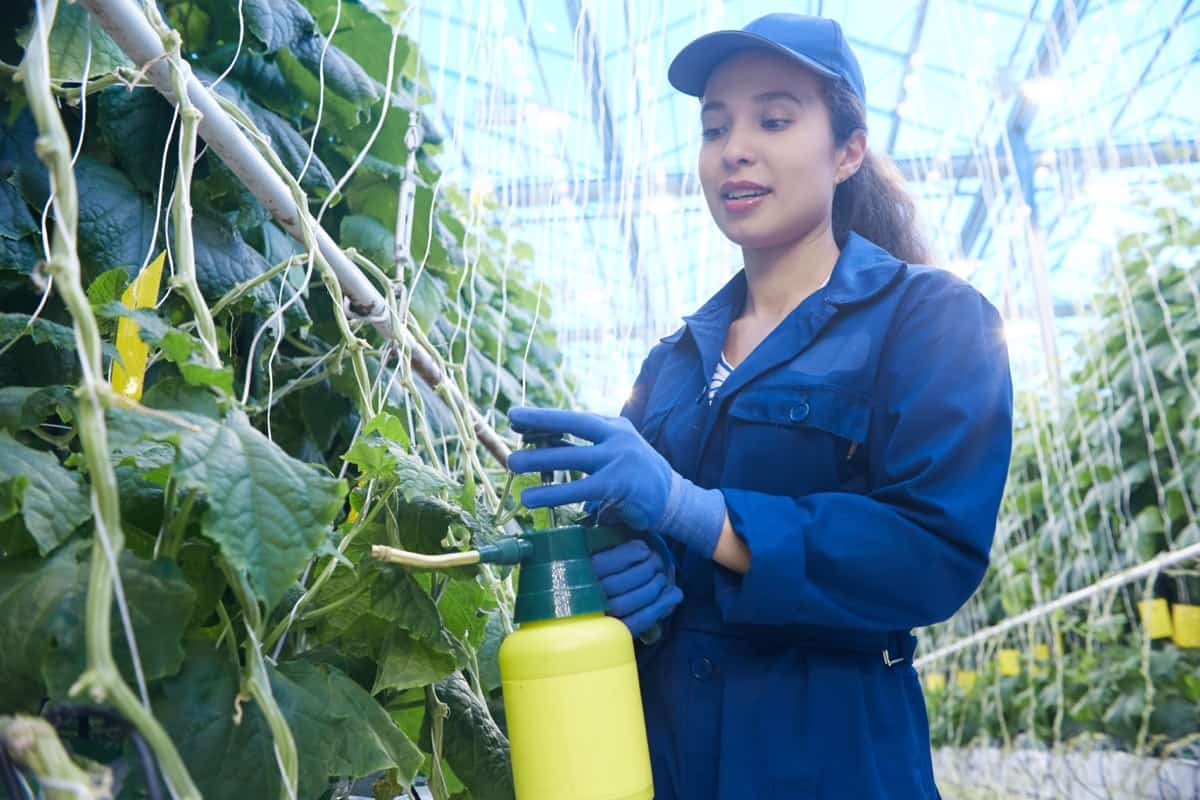
Conclusion
Biopesticides are an important tool for farmers to protect their crops and maintain the health of their soil. Biopesticides are an important part of sustainable agriculture because they can be used to reduce or eliminate synthetic pesticides, which can harm the environment.
- Types of Pesticides Used in Agriculture: A Beginner’s Guide
- Economical Aquaculture: A Guide to Low-Budget Fish Farming
- 15 Common Planting Errors That Can Doom Your Fruit Trees
- How to Make Houseplants Bushy: Effective Tips and Ideas
- Innovative Strategies for Boosting Coconut Pollination and Yield
- Pollination Strategies for Maximum Pumpkin Yield
- The Complete Guide to Chicken Fattening: Strategies for Maximum Growth
- Natural Solutions for Tulip Problems: 100% Effective Remedies for Leaf and Bulb-Related Issues
- Revolutionizing Citrus Preservation: Towards a Healthier, Greener Future
- Natural Solutions for Peony Leaf and Flower Problems: 100% Effective Remedies
- Maximizing Profits with Avocado Contract Farming in India: A Comprehensive Guide
- Natural Solutions for Hydrangea Problems: 100% Effective Remedies for Leaf and Flowers
- The Ultimate Guide to Choosing the Perfect Foliage Friend: Bringing Life Indoors
- From Sunlight to Sustainability: 15 Ways to Use Solar Technology in Agriculture
- The Ultimate Guide to Dong Tao Chicken: Exploring from History to Raising
- The Eco-Friendly Makeover: How to Convert Your Unused Swimming Pool into a Fish Pond
- Mastering the Art of Delaware Chicken Farming: Essentials for Healthy Backyard Flocks
- 20 Best Homemade Fertilizers for Money Plant: DIY Recipes and Application Methods
- How to Craft a Comprehensive Free-Range Chicken Farming Business Plan
- Brighten Your Flock: Raising Easter Egger Chickens for Beauty and Bounty
- How to Optimize Your Poultry Egg Farm Business Plan with These Strategies
- Subsidy for Spirulina Cultivation: How Indian Government Schemes Encouraging Spirulina Farmers
- Ultimate Guide to Raising Dominique Chickens: Breeding, Feeding, Egg-Production, and Care
- Mastering the Art of Raising Jersey Giant Chickens: Care, Feeding, and More
- Ultimate Guide to Raising Legbar Chickens: Breeding, Farming Practices, Diet, Egg-Production
- How to Raise Welsummer Chickens: A Comprehensive Guide for Beginners
- How to Protect Indoor Plants in Winter: A Comprehensive Guide
- Ultimate Guide to Grow Bag Gardening: Tips, Tricks, and Planting Ideas for Urban Gardeners
- Guide to Lotus Cultivation: How to Propagate, Plant, Grow, Care, Cost, and Profit
- Agriculture Drone Subsidy Scheme: Government Kisan Subsidy, License, and How to Apply Online
- Ultimate Guide to Raising Araucana Chickens: Breed Profile, Farming Economics, Diet, and Care
- Bringing Hydroponics to Classroom: Importance, Benefits of Learning for School Students
- Ultimate Guide to Raising Polish Chickens: Breed Profile, Farming Economics, Diet, and Care
- Ultimate Guide to Raising Australorp Chickens: Profile, Farming Economics, Egg Production, Diet, and Care
- Silkie Chicken Farming: Raising Practices, Varieties, Egg Production, Diet, and Care
- Sussex Chicken Farming: Raising Practices, Varieties, Egg Production, Diet and Care